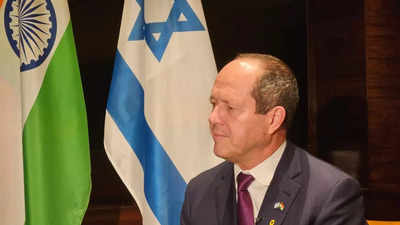
Amid concerns in India and elsewhere about the future of the
How confident are you that the ceasefire with Lebanon will hold, given that both sides are already accusing each other of violating it?
Hezbollah joined the war unfortunately and fired 25,000 rockets at Israel since October 8 last year. This was unacceptable to Israel. It became important to dismantle their terrorist infrastructure. We will react with a lot of force if they violate the ceasefire. I think this is also an opportunity for the Lebanese people to free themselves from Hezbollah, the proxy of Iran. Beirut could become the Paris of the Middle-East. Unfortunately, the Lebanese people have so far not fulfilled that vision.
US and others are working for a ceasefire in Gaza too. Can we hope to see a similar truce in Gaza? Can India play a role in facilitating peace?
Lebanon is different from Gaza. The goal of the war from the Israeli side in Lebanon was to eliminate the Hezbollah threat and enable the 60,000 evicted Israeli citizens (from northern Israel) to return home. We are in the process of doing that. In Gaza, there are 2 major goals of the war. The first is to make sure Hamas doesn’t survive either militarily or in civil form. The second is to get the hostages back. We need to fulfil the goals of the war. There’s still work to do. If and when it’s possible to have a deal to get the hostages back, I’m sure the Israeli government will consider it. India is a great partner for Israel. Let’s do more business. Let’s improve the economy and let’s create more win-win deals. We are very well aligned on political issues and on the economic side we have some work to do. We are very optimistic we can take that relationship between the governments and the people forward.
What about the delay in work on IMEEC that was seen even by Israel as an initiative that could change the face of the Middle-East?
The war may have delayed it but it was the goal of Iran and its jihadi proxies to destroy Israel and disrupt businesses in the region and all of West Asia. Our goal is exactly the opposite. We want to collaborate. Iran tried to derail the peace process and relationship developing with Saudi Arabia. We would like to see Saudi Arabia join the Abraham Accords and expand peace. Our goal is exactly the goal of India. To create more partnerships and have collaboration. People trying to delay it are the jihadi alliance of Iran and its proxies.
Are you ready to restart talks with Saudi Arabia for normalization of ties?
Most certainly, yes. I think it’s very clear that it’s in the best interests of both countries. We hear it again and again. Our friends in the US are saying so. Even here, our friends are talking about it. We have to finish the war and in parallel develop relationships with modern Arab states. It’s a classic win-win for West Asia.
Is the US indictment of Adani, whose company is working on the Haifa port, a concern for Israel?
This is not an issue for us. We welcome Adani and other players to invest in Israel.
What does the return of Trump mean for West Asia?
It’s going to be meaningful. Trump is aligning his economic power with his geopolitical strategy. I think that distinction is very clear and that’s how the Israeli government also sees it. We have to align our interests against Iran which is the biggest destabilizer in West Asia and expand relations with friends like India. I think it’s very smart and prudent if you can align economic issues, like tariffs and other things that he’s trying to do, with geopolitical challenges. It will be good for countries like India and Israel.
PM Netanyahu was expected to visit India last year before October 7 happened. Is the visit still on the cards?
My recommendation to him would be that this should be one of the first important trips he should undertake. India is a good friend of Israel. The fact that Modi on October 7 supported Israel is very meaningful for us. It will be a good opportunity to thank Modi and the people of India for their support. We don’t take it for granted.





